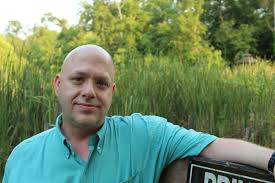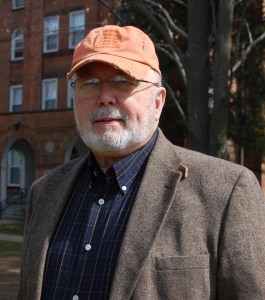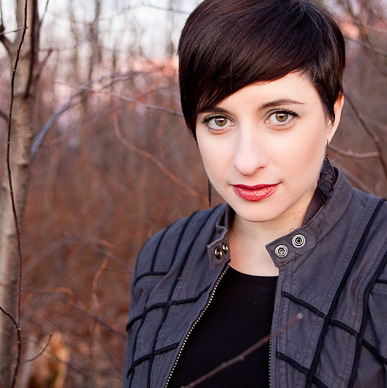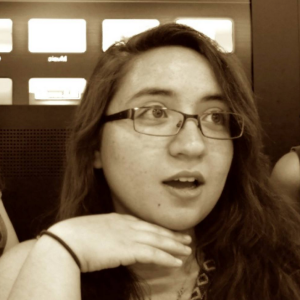
Kristiana Kahakauwila: In my mind, Pinckney, you’re the honey badger of writers. That is to say, in your writing, you are “the most fearless animal in all the animal kingdom. [You] really don’t give a shit.” In your work, I find a deep attention to craft, but also this resistance to expected structures and narrative forms. There’s a sense, as I read the stories in Miracle Boy in particular, that the story genre is getting remade. Did you set out to undo expectations of the story genre? Or did the impetus come from elsewhere?
Pinckney Benedict: Holy crow! I’ve just Googled this thing, and now I want to be the honey badger of the animal world. That’s what I always pictured when I read the unspeakably great Saki story “Sredni Vashtar,” which features an animal called a polecat-ferret, supposedly terrible and vicious, which turns out to be disappointingly domesticated when you investigate it. I loved that story as a kid, but then I found out many years later, through the wonders of the internet, that a puny little polecat-ferret couldn’t possibly do what the animal in that story manages. “Sredni Vashtar went forth, his thoughts were red thoughts and his teeth were white. His enemies called for peace, but he brought them death. Sredni Vashtar the Beautiful.” From now on when I read that story, I’ll just substitute honey badger for polecat-ferret, and the whole thing will work for me again. A classic restored!
Much as I suppose I just did with that extended non-answer to a gracious and flattering question, I tend to chase my own thoughts and impulses down some pretty long, dark, twisty, and highly personal rabbit-holes. I’m not so much trying to undo anybody’s expectations as I am trying to follow the story where it seems to me that it leads, whether or not that’s a conventional pattern. I’m not afraid of conventional structure and am happy to embrace it when the story seems to call for it; I have a lot of pretty much conventionally plotted stories, and it pleases me when things work out that way, because I can be pretty sure that even casual readers unfamiliar with my work will follow along.
By the time you get to the stories in Miracle Boy, though, it’s true that I’ve developed a certain faith in readers who come across my fiction and their desire to see a story by me, written as I choose to write stories. Nobody stumbles onto my stuff randomly in the bookstore; nobody comes across my work by accident. It’s one of the benefits of being relatively little known. Folks who come to my work tend to do so voluntarily and with a reasonable amount of good will going in, and I feel pretty free to throw some pretty tough challenges at them. I try always to arrange some alternate sort of satisfaction for every readerly expectation I frustrate, though. I love feeling that you might come away from one of my stories having encountered something entirely unexpected but something also satisfying and fulfilling.
KK: You seem willing to follow your obsessions into anything– the graphic novel, religious explication, stories about cars, low-budget Canadian horror films. How do you amass these interests? And what kind of courage does it take to put your obsessions on the page? Do you ever censor or hold yourself back?
PB: I love Jesus, cars, and guns, sadly not necessarily in that order, and so I guess it’s no surprise that those elements show up in a lot of my fiction. I often gift my characters with objects that I myself want–a rare muscle car, a classic firearm, gifts of ability or religious fervor–that I myself will for one reason or another never possess. I tend to write about people who live in environments where they’ll encounter the objects of my obsessions and who very frequently share them. That way I can convincingly embody their thoughts, their knowledge, and their energies. It also means my characters behave in ways that interest me, ways that I’d probably behave if I didn’t have to worry about keeping a job, a family, staying alive, and so on, or if I had a stronger personality and no desire for advancement or to be accepted in the community in which I find myself. I end up being genuinely interested in whether they live or die, prosper or wither, find love or die alone, because they are somehow me, if the world had been just a bit different.
The graphic fiction thing has brought a lot of pleasure into my life. And I do have one, now that I think about it, that deals with Jesus (it was published on an intensely readable site called plotswithguns.com, now sadly defunct, I believe) called “Run, Killer, Run! Go, Killer, Go!” In that one, Jesus wields an Army Colt in either hand and has a shining sword coming out of his mouth. My kind of Jesus. The piece was titled by my son, who was a little boy then and who loved to help me out with titles, and it’s a primer for people (re)born into the terrifying year 2509. And another, called “Kentucky Samurai,” tells the story of a young ronin who wears his ancestral armor and drives his father’s Boss 429 Mustang into the wilds of West Virginia to seek after adventure and death when Kentucky proves too pacific for his war-like tastes.
So no, I don’t censor myself much when it comes to putting my own impulses on the page. It’s not courage, though, I don’t think. More like an incapacity to monitor my thoughts properly when I get excited, coupled with the feeling that I have to dig that stuff out of my skull somehow or I’ll go crazy from its clustering and fermenting and gestating in there. It’s impossible for me to imagine that, if something seems impossibly cool to me, others won’t find it that way as well, which is probably a failure of empathy but is a dysfunction that appears to have served me reasonably well so far.

KK: I felt that with the names you chose for characters. They’re unexpected, challenging (especially because they require a reader to learn the allusions) but they’re also deeply satisfying. For example, in “The Beginnings of Sorrow” your main character is named Vandal. His dog is Hark. His father Xerxes. Each of these names will resonate with the meaning of the story. At what point in your construction of a story do you choose characters’ names? And how do you find names that are so perfect and so otherworldly?
PB: As somebody with an alliterative name, and the (to me) exotic and challenging last name Kahakauwila, you no doubt learned to pay attention to names much the same way I did: by fighting (either rhetorically or, just as often in my case, physically) to establish your name’s seriousness and legitimacy. Perhaps you also spent time, as I did, wondering, “Why me, God?” And when God responded neither by changing your name to something more ordinary nor by giving the people around you profounder sympathy for those of us with irregular names, you just shrugged and prepared to put up your dukes (literally or metaphorically) yet again, until finally you grew into your name and/or people stopped wanting to fight you over it.
Or maybe you didn’t, but I sure did, and the struggle gave me an intense interest in naming and in the power of names. I was pretty happy as a kid to find out that ancient and venerable civilizations–back to the Bible again!–regarded naming with deadly solemnity, because the familial accident of my name made it seem a matter of grave importance to me as well. So I take it pretty seriously in my stories, storing up names in a great long list for months or even years before I find the right character on whom to expend them. For “Beginnings of Sorrow,” I felt that the story possessed sufficient mythical dimension that I could deploy some particularly pungent names I’d been saving up: Vandal, Xerxes, and so on.
And Hark, the dog, is named that in part because the name is short and sharp and rhymes with “bark,” and, you know, Hark!, because we need to listen to him because he’s the first of the talking dogs and what’s that all about? It’s also the name of a character, a scary spy, in James Thurber’s The Thirteen Clocks, a picture book that creeped me right the fuck out when I was a kid. It’s a book in which a character’s name beginning with X (Xingu, if I recall correctly) is a big deal, and that contains a poem one terrifying stanza of which reads, “Hark, hark, the dogs do bark,/ The Duke is fond of kittens./ He likes to take their insides out,/ And use their fur for mittens.” Holy shit!
As always, too, for me, it comes back to growing up in West Virginia, in a region where people had old, dignified, incredibly rich names, names that had gorgeously transmogrified through generations of misspelling and isolation, names the connected to the land, multisyllabic names that sounded like they must magically mean something: names like Belcher, Seldomridge, Brackenridge, Loudermilk, Tuckwiller, Snedegar, Argabright. If I had gotten nothing else out of growing up in Greenbrier County, I’d have been gifted with a great wealth of hugely evocative names. I’ve also had generous folks bequeath me their names, when I’ve asked and sometimes when I haven’t, for use in my stories–a guy named Miles Feather, for instance (I love names that are objects: Broom, Bone, Candles), and the fabulously named Attilla Fuat Gokbudak. Names to me are better than money.
KK: I’ll be seeing you at the Association of Writers and Writing Programs (AWP) conference in Minnesota in April. With more than 10,000 writers in attendance, it’s an intensely social conference. Although writers are often pictured working alone, hunched over a wooden desk in some candlelit room, skittish if called out of our reverie, we do sometimes enjoy a little human contact. In terms of your writing process, what kind of social interactions solicit ideas, inspire, or make you excited to get back to the page?
PB: I’m not a particularly social person. As my wife, the novelist Laura Benedict, likes (with great accuracy) to say, “If the Benedicts are invited, then it must be a very large party indeed.” The same is true of my writing life. I have a very small number of folks to whom I show my work when it’s drafted, and they tend not to be writers, or at least professional writers, because people who think of themselves as writers tend to focus on fiddly technical aspects of the work. I’m pretty solid on the technical stuff, generally speaking, and what I want to know is when I’m finished writing is, Does this work as a story? Basic stuff, non-esoteric. Are you sufficiently interested in this character and his dilemma that you’ll hang with the weird curve-balls that I tend to throw? Have I gotten so hung up on my own cleverness with language that you start to lose track of what’s going on? Is it exciting? Did it scare you? In two or three days will you still be thinking about that guy with his face ripped off?
These are the kinds of questions that writers often don’t seem willing to ask, of themselves or others, apparently. They seem beneath us, maybe, as though our interestingness weren’t ever in question, or as though that might be a base thing to try to strive for, to intrigue another human being into turning to the next page rather than going to sleep or flipping on the TV. And really, it’s all we want and all we should want, and more than most of us will ever achieve. But the other stuff is easier to talk about: this section needs to be in present tense (writers worry so much about tenses! and readers pretty much never do, in my experience) or your images are very pretty here. The stuff that is tough to talk about–you are boring me here and it makes me hate you and wish that you would die–never gets said.
So my close friends tend not to be writers, or at least people who think of themselves primarily as writers, though they may in fact be excellent writers. They tend to be big readers, though, and that’s a difference: writers say they read a lot, sure, but writers, I have found, lie. And they lie a lot about how much they read.
So when somebody I like (and I make sure that I like my early readers, because why would I care to try to please and intrigue someone I do not like a great deal? and I make sure that they like me, because why would they bother to tell useful truths to someone who they did not like a great deal?) and trust says to me, “This is a good story” or “This is not a good story, and here’s what I didn’t care for,” then I’m inspired to go back to it, to fix what’s wrong or to double down on what’s right. Other sorts of social interactions drive me back to the word processor just because the world outside my head is so full or distractions and unattractive, frightening, confusing weirdnesses. The weirdness inside my head makes me happy.
That said: Hey everybody! Looking forward to seeing you at AWP!
KK: Yes, Everyone, see you at AWP! On our panel we’ll be speaking about the influence of Joyce Carol Oates and how her mentorship shaped our work, our teaching, and our writing lives.
Pinckney, you studied under Joyce as an undergraduate at Princeton University and have spoken of her with deep regard. What freedoms or permissions did she give you that affected your writing and your writing life?
PB: It’s pretty simple. At the beginning stages of my writing life, she liked what I was doing and said so unequivocally. That was all the permission I needed and all the permission I have ever needed. When I went off to grad school, for instance, it was pretty obvious that the people around me couldn’t stand what I was doing. All I had to do, though, was think to myself, “Hey, buddy! This hillbilly nonsense was good enough for Joyce Carol Oates, so nerts to you!” That attitude has stuck with me.
KK: r.k.vr.y’s founding editor, Victoria Pynchon, quotes an interview with a sculptor who advised that the secret to a successful and happy life was to “choose to do something with your life about which you’re passionate but which you cannot ever accomplish.” Is there an aspect of writing that you feel like you’ll never accomplish, but that you love continually striving for?
PB: Oh yes. That seems right to me, because I am made very much in the old-fashioned tragic mold, as opposed to the therapeutic one I seem to see so much of all around me these days. My gloriously doomed project? I want to capture, fully and completely, in every shading, nuance, and tone, the time and the place in which I grew up, populated by all the people among whom I lived.
This is, I suppose, something like what my old teacher and yours, JCO, used to refer to as the writer’s “great subject”: the thing that is at the heart of all the writing, and each new piece reveals just a bit more of it, so that the whole is composed over the course of years and decades, a lifetime’s labor. That’s one of the reasons that I’m not in any hurry, generally speaking, over what I do or how much I publish: I have no burning desire to create or to put out any single story, because they are all–I hope, if I’m doing my job right–just little pieces of this vast story of a single brief moment in an insignificant place that passed out of being many years ago and that can never with any real hope of accuracy be recaptured.
That’s the unachievable goal I’ve been pursuing for many years now, and I am, if I say so myself, happy as a clam.
Kristiana Kahakauwila is the author of THIS IS PARADISE: STORIES (Hogarth, 2013) and a fervent admirer of Pinckney Benedict’s work and wicked sense of humor.















